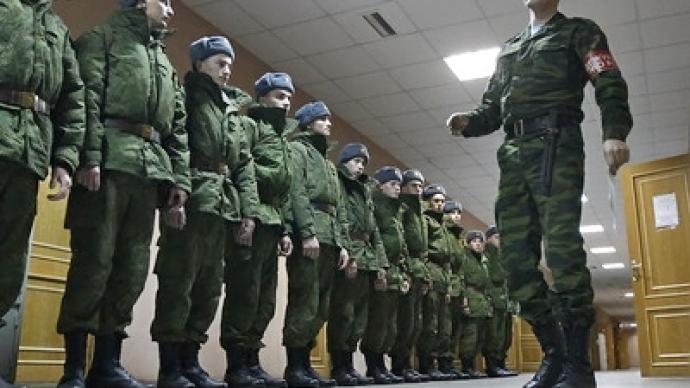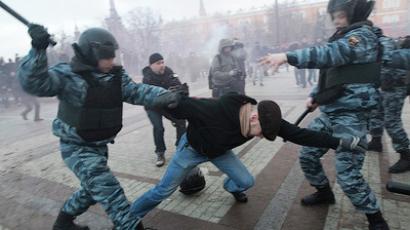Extremism and violence on the rise among servicemen – Military Prosecutor

Russia’s Military Prosecutor General Sergey Fridinsky has called for urgent measures to be introduced to tackle violence in the Army where the crime rate – including those related to hate crimes - has increased significantly in recent months.
The statistics are pretty worrying, as they reveal that in 2010 alone the number of violent crimes in the Russian Army rose by 16 %. Thousands of servicemen have suffered offences, and the situation is not getting any better: since the beginning of this year, over 500 offences have been registered where over 20 soldiers were seriously injured and two young men were killed. The rate of violence committed by commanders against their subordinates has risen 30% in 2011, Fridinsky said on Friday, speaking at a coordination meeting of chief law enforcers in the Russian Armed Forces. Over 50 squadron commanders were sentenced to imprisonment for such crimes. "Officers are increasingly using violence against subordinates to compensate for the lack of training skills," he pointed out, cites Interfax. To a large extent, the loss of skill can be explained by increased workload on unit commanders and a simultaneous sharp decline in the number of training officers.It is often said that the Army is a reflection of society, which perhaps is true. Interethnic tensions within Russian society have intensified of late, and so have the number of extremism crimes in the Russian Armed Forces.“Changes in approach for gathering new troops, combined with the under-handed tactics of commanders has led to servicemen from different ethnic groups or regions trying to enforce their own rules and order in their units,” Fridinsky said at the meetingThe official recalled that last year there were negative consequences of similar actions in the Central Military District and the Baltic Fleet, which evoked a huge public response and investigations by military prosecutors: In the Kaliningrad region, a group of sailors recruited from North Caucasian republics had repeatedly hazed servicemen from other regions recruited to the Baltic Fleet in the spring of 2009.Speaking on Friday, Fridinsky criticized his colleagues from the military investigation department for lack of efficiency in their work. He said that while army bullying cases are steadily increasing, only every sixth such case was ever revealed. Commanders also fell under fire as, according to the chief military prosecutor, they often conceal crimes from being officially registered.“This year alone, prosecutors uncovered 23 crimes that had been hidden. One in three of those offences was related to violence, and one in four was a serious offense,” Fridinsky stated. Within the next several years, Russia is planning to spend over 20 trillion rubles (about US $640 billion) to modernize its army. As part of a large-scale military reform launched by President Dmitry Medvedev, the number of officers in the armed forces will be increased by 70,000 in 2012, Defense Minister Anatoly Serdyukov announced earlier. The goal is to create modern and mobile forces equipped with brand new military hardware. According to the plan, their number of servicemen will be reduced from 1.2 million to one million by 2012. But it remains to be seen whether those measures will help to solve the problem with the violence within the Armed Forces, and whether parents will have to worry that their sons may be returned home in a zinc coffin.














